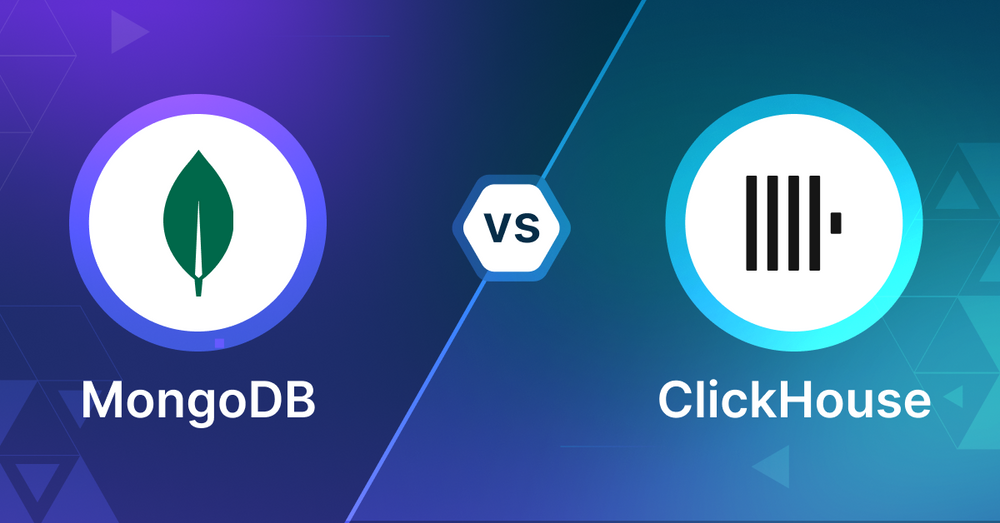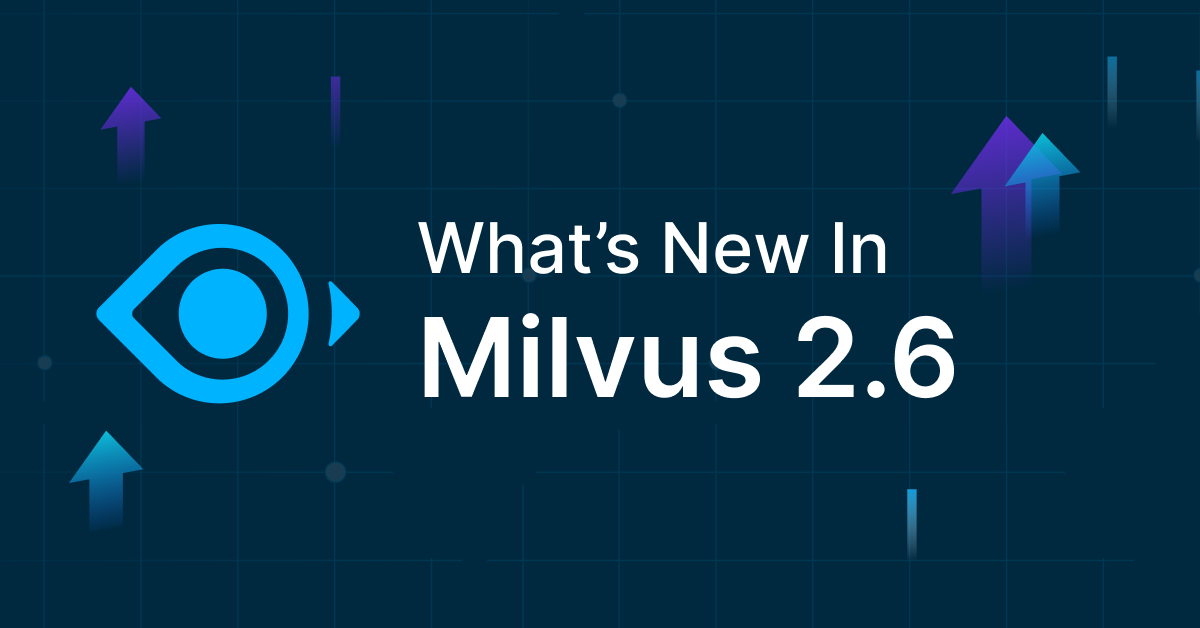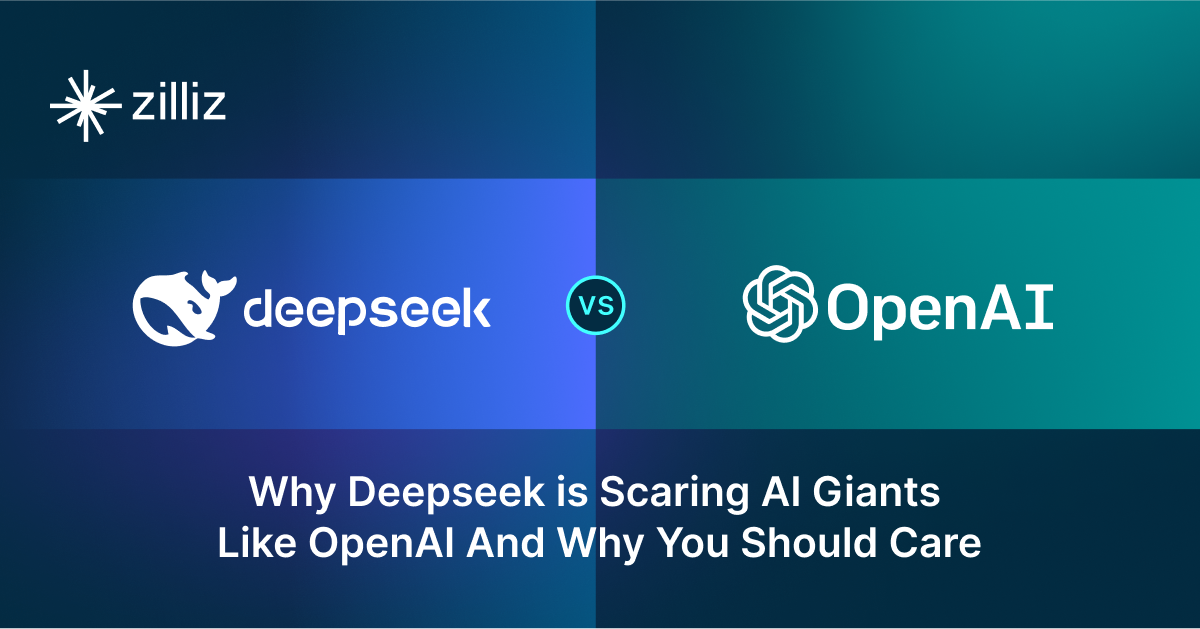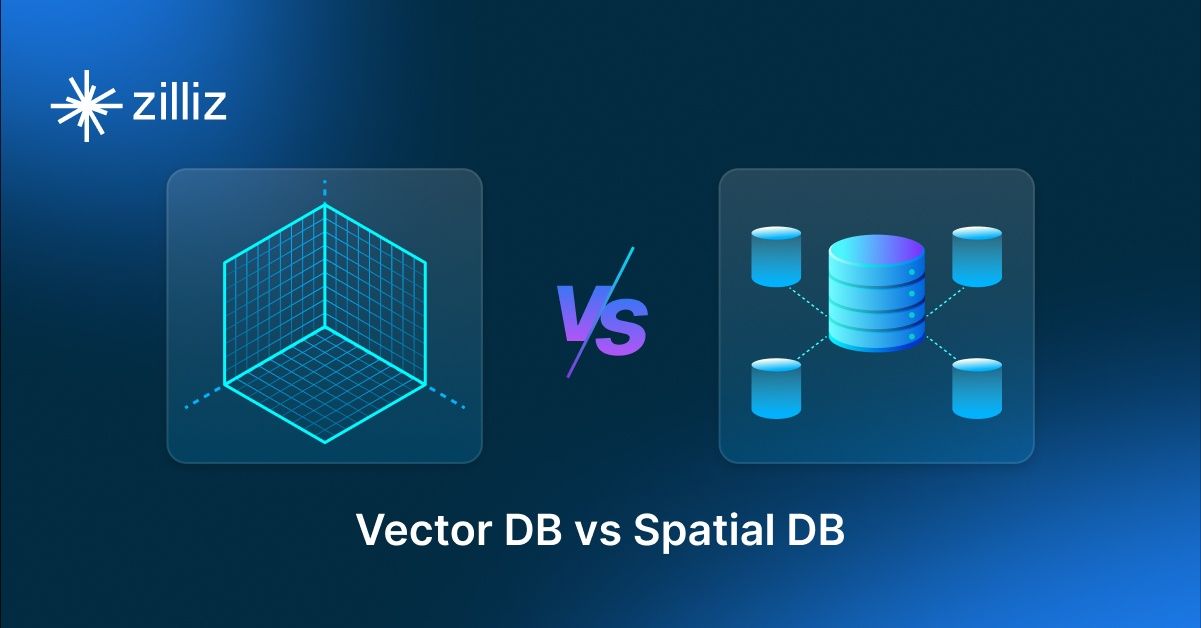MongoDB vs ClickHouse: Selecting the Right Database for GenAI Applications

As AI-driven applications evolve, the importance of vector search capabilities in supporting these advancements cannot be overstated. This blog post will discuss two prominent databases with vector search capabilities: MongoDB and ClickHouse. Each provides robust capabilities for handling vector search, an essential feature for applications such as recommendation engines, image retrieval, and semantic search. Our goal is to provide developers and engineers with a clear comparison, aiding in the decision of which database best aligns with their specific requirements.
What is a Vector Database?
Before we compare MongoDB vs ClickHosue, let's first explore the concept of vector databases.
A vector database is specifically designed to store and query high-dimensional vectors, which are numerical representations of unstructured data. These vectors encode complex information, such as the semantic meaning of text, the visual features of images, or product attributes. By enabling efficient similarity searches, vector databases play a pivotal role in AI applications, allowing for more advanced data analysis and retrieval.
Common use cases for vector databases include e-commerce product recommendations, content discovery platforms, anomaly detection in cybersecurity, medical image analysis, and natural language processing (NLP) tasks. They also play a crucial role in Retrieval Augmented Generation (RAG), a technique that enhances the performance of large language models (LLMs) by providing external knowledge to reduce issues like AI hallucinations.
There are many types of vector databases available in the market, including:
- Purpose-built vector databases such as Milvus, Zilliz Cloud (fully managed Milvus)
- Vector search libraries such as Faiss and Annoy.
- Lightweight vector databases such as Chroma and Milvus Lite.
- Traditional databases with vector search add-ons capable of performing small-scale vector searches.
MongoDB is a NoSQL database that stores data in JSON-like documents and ClickHouse is an open-source column-oriented database. Both have vector search capabilities as an add-on. This post compares their vector search capabilities.
MongoDB: The Basics
MongoDB Atlas Vector Search is a feature that allows you to do vector similarity searches on data stored in MongoDB Atlas. You can index and query high-dimensional vector embeddings along with your document data and do AI and machine learning right in the database.
At its core, Atlas Vector Search uses the Hierarchical Navigable Small World (HNSW) algorithm for indexing and searching vector data. This creates a multi-level graph of the vector space so you can do Approximate Nearest Neighbor (ANN) searches. It’s a balance of speed and accuracy for large scale vector search. Atlas Vector Search also supports Exact Nearest Neighbors (ENN) searches which prioritizes accuracy over performance for queries of up to 10,000 documents.
One of the big advantages of Atlas Vector Search is its integration with MongoDB’s flexible document model. You can store vector embeddings along with other document data so you can search more contextually and precisely. You can query any kind of data that can be embedded up to 4096 dimensions. Atlas Vector Search allows you to combine vector similarity searches with traditional document filtering. For example, a semantic search for products could be filtered by category, price range or availability.
Atlas Vector Search also supports hybrid search, combining vector search with full text search for more granular results. This is different from Atlas Search which is focused on keyword based search. The platform integrates with popular AI services and tools so you can use it with embedding models from providers like OpenAI, VoyageAI and many others listed on Hugging Face. It also supports open-source frameworks like LangChain and LlamaIndex for building applications that use Large Language Models (LLMs).
To ensure scalability and performance, MongoDB Atlas provides Search Nodes, which provides dedicated infrastructure for Atlas Search and Vector Search workloads. This allows you to have optimized compute resources and independent scaling of search needs so you get better performance at scale.
By having these capabilities in the MongoDB ecosystem, Atlas Vector Search is a full solution for developers building AI powered applications, recommendation systems or advanced search features. No need for a separate vector database, you can use MongoDB’s scalability and rich features along with vector search.
ClickHouse: The Basics
ClickHouse is an open-source OLAP database for real-time analytics with full SQL support and fast query processing. It’s great for analytical queries because of fully parallelized query pipeline and can do vector search fast. It has high compression (customizable through codecs) so can store and query big datasets. One of its main advantages is that it can handle multi-TB datasets without being memory bound so it’s a great tool for users with large vector data. Also supports filtering and aggregation on metadata, so you can query vectors and their metadata.
ClickHouse has vector search functionality through SQL where vector distance operations are just like any other SQL function. So you can combine it with traditional filtering and aggregation. Great for use cases where you need to query vector data along with metadata or other information. Also has experimental Approximate Nearest Neighbour (ANN) indices for faster (but approximate) matching. And exact matching through linear scan over rows with parallel processing for speed and efficiency.
ClickHouse is great for vector search when you need to combine vector matching with metadata filtering or aggregation. Especially for very large vector datasets that need to be processed in parallel across multiple CPU cores. ClickHouse is also good when you need SQL support and your vector dataset is too big to fit in memory-only indices. Also if you already have related data in ClickHouse or don’t want to learn another tool to manage millions of vectors, ClickHouse can save you time and resources. Fast parallelized exact matching and handling big datasets is what ClickHouse is good for, so it’s for advanced search users.
ClickHouse is a general purpose platform for vector search, especially for large datasets that need parallel processing and when you combine vector search with SQL-based filtering and aggregation. Not as good as specialized vector databases for small memory-bound datasets or high-QPS scenarios but can handle complex queries including metadata so great for developers who know SQL and need fast vector search.
Key Differences
MongoDB Atlas Vector Search and ClickHouse have different approaches to vector search, each with their own strengths. Let’s compare them to help you decide which one is right for you.
Search Methodology
MongoDB Atlas Vector Search uses the Hierarchical Navigable Small World (HNSW) algorithm for indexing and searching vector data. It creates a multi-level graph of the vector space for Approximate Nearest Neighbor (ANN) searches. It balances speed and accuracy for large scale vector search. Atlas Vector Search also supports Exact Nearest Neighbors (ENN) searches for queries of up to 10,000 documents, performance over accuracy.
ClickHouse, on the other hand, primarily uses SQL-based vector distance operations. It supports exact matching through linear scan over rows with parallel processing. ClickHouse also offers experimental vector indices for faster ANN searches.
Data Handling
MongoDB is great for handling flexible, document-based data. You can store vector embeddings alongside other document data, so you can do more contextual and precise searches. This flexibility allows you to combine vector similarity searches with document filtering.
ClickHouse is designed for analytical queries on structured data. It supports vector search through SQL where vector distance operations are treated like any other SQL function. So you can easily combine vector queries with filtering and aggregation.
Scalability and Performance
MongoDB Atlas has Search Nodes which provides dedicated infrastructure for Atlas Search and Vector Search workloads. This allows for optimized compute resources and independent scaling of search needs so you get better performance at scale.
ClickHouse is great for handling multi-TB datasets without being memory bound. It has fully parallelized query pipeline so it’s efficient for large vector datasets that need to be processed across multiple CPU cores.
Flexibility and Customization
MongoDB’s flexible document model allows you to store and query different types of data, including vector embeddings up to 4096 dimensions. You can easily combine vector similarity searches with other document filters.
ClickHouse has flexibility through its SQL interface where you can combine vector operations with standard SQL queries. It also has customizable compression options through codecs so you can store large datasets efficiently.
Integration and Ecosystem
MongoDB Atlas Vector Search integrates with popular AI services and tools. It supports embedding models from OpenAI and VoyageAI and works with open-source frameworks like LangChain and LlamaIndex for building applications with Large Language Models (LLMs).
ClickHouse, being a general purpose analytical database, may require additional integration work for specific AI tooling. But its SQL interface is familiar to many developers and data analysts.
Ease of Use
MongoDB Atlas is a managed service which can simplify setup and maintenance. Its integration with the broader MongoDB ecosystem makes it easier for teams already familiar with MongoDB.
ClickHouse has a steeper learning curve for those not familiar with OLAP databases or SQL. But for SQL proficient developers, its vector search is accessible through familiar query syntax.
Cost Considerations
MongoDB Atlas is a fully managed service which may come with higher operational costs but lower maintenance overhead.
ClickHouse being open-source has lower upfront costs but may require more in-house expertise for deployment and management.
Security Features
Both MongoDB Atlas and ClickHouse have robust security features. MongoDB Atlas has end-to-end encryption, role-based access control and network isolation. ClickHouse has data encryption, access control and authentication mechanisms.
When to Choose Each
MongoDB Atlas Vector Search is the better choice when you're working with flexible, document-based data structures and need to combine vector search with traditional document querying. It's particularly suitable for applications that require seamless integration with AI services and tools, such as recommendation systems, semantic search engines, or AI-powered content analysis. If you're already using MongoDB or need a managed service that can handle both your regular database operations and vector search needs, MongoDB Atlas Vector Search is a single solution that can simplify your tech stack and reduce operational overhead.
ClickHouse is best when you have massive datasets that require complex queries combining vector search with SQL filtering and aggregation. It’s the choice for scenarios where you have multi-TB vector datasets that are too big for memory only indices, especially when you need fast, parallelized exact matching. ClickHouse is great for advanced search use cases in data analytics where you need to query vector data along with metadata or other structured information. If your team is SQL savvy and you’re looking for a powerful open source solution that can handle both vector search and traditional OLAP workloads, ClickHouse is the answer.
Summary
MongoDB Atlas Vector Search is best for flexibility, AI integration and ease of use within the MongoDB ecosystem, a managed service that combines document database with vector search. ClickHouse is best for handling massive datasets, powerful SQL based vector operations and high performance analytical queries. Your choice between these should be driven by your use case, data types and performance requirements. Choose MongoDB Atlas if you need a flexible AI ready solution with managed services, and ClickHouse if you have very large datasets that require complex queries combining vector search with SQL. Ultimately it’s about aligning the technology’s strengths with your project’s needs and your team’s expertise.
Read this to get an overview of MongoDB and ClickHouse but to evaluate these you need to evaluate based on your use case. One tool that can help with that is VectorDBBench, an open-source benchmarking tool for vector database comparison. In the end, thorough benchmarking with your own datasets and query patterns will be key to making a decision between these two powerful but different approaches to vector search in distributed database systems.
Using Open-source VectorDBBench to Evaluate and Compare Vector Databases on Your Own
VectorDBBench is an open-source benchmarking tool for users who need high-performance data storage and retrieval systems, especially vector databases. This tool allows users to test and compare different vector database systems like Milvus and Zilliz Cloud (the managed Milvus) using their own datasets and find the one that fits their use cases. With VectorDBBench, users can make decisions based on actual vector database performance rather than marketing claims or hearsay.
VectorDBBench is written in Python and licensed under the MIT open-source license, meaning anyone can freely use, modify, and distribute it. The tool is actively maintained by a community of developers committed to improving its features and performance.
Download VectorDBBench from its GitHub repository to reproduce our benchmark results or obtain performance results on your own datasets.
Take a quick look at the performance of mainstream vector databases on the VectorDBBench Leaderboard.
Read the following blogs to learn more about vector database evaluation.
Further Resources about VectorDB, GenAI, and ML
- What is a Vector Database?
- MongoDB: The Basics
- ClickHouse: The Basics
- Key Differences
- When to Choose Each
- Summary
- Using Open-source VectorDBBench to Evaluate and Compare Vector Databases on Your Own
- Further Resources about VectorDB, GenAI, and ML
Content
Start Free, Scale Easily
Try the fully-managed vector database built for your GenAI applications.
Try Zilliz Cloud for FreeKeep Reading

Democratizing AI: Making Vector Search Powerful and Affordable
Zilliz democratizes AI vector search with Milvus 2.6 and Zilliz Cloud for powerful, affordable scalability, cutting costs in infrastructure, operations, and development.

Why Deepseek is Waking up AI Giants Like OpenAI And Why You Should Care
Discover how DeepSeek R1's open-source AI model with superior reasoning capabilities and lower costs is disrupting the AI landscape and challenging tech giants like OpenAI.

Vector Databases vs. Spatial Databases
Use a vector database for AI-powered similarity search; use a spatial database for geographic and geometric data analysis and querying.
The Definitive Guide to Choosing a Vector Database
Overwhelmed by all the options? Learn key features to look for & how to evaluate with your own data. Choose with confidence.